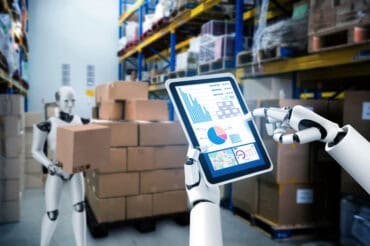
Working towards a lower carbon future will demand that moves be made around operational efficiency, improved production tactics, and minimized waste – all of which can be accomplished with Cognitive AI solutions.
Our world has reached a point where society recognizes that the planet is under stress. Businesses across industries are announcing plans to shrink their carbon footprints to “net zero” over the next few decades, with most targeting to hit goals between 2030 and 2050. While strategies around net-zero have been critical to the operational plans of industries most impacted, like energy and oil and gas, establishing sustainability goals has become the norm for most sectors.
Environmental, social, and governmental (ESG) issues have become an increasingly important topic of discussion. A recent McKinsey survey found that 83% of C-suite executives and investment professionals believe that ESG programs will contribute more shareholder value in five years than today, indicating their potential short and long-term value.
With CO2 emissions projected to increase to some 43.08 billion metric tons in 2050, businesses must adopt solutions to reduce or offset their carbon footprint. Yet, the difficulty and expense of measuring carbon efforts and reducing or offsetting those challenges have forced many companies to delay their efforts. However, Cognitive AI solutions can play a key role in helping companies and industries achieve net-zero ambitions with ease and at a lower cost.
A Human Approach to AI
Most AI tools tend to operate in black boxes where human users cannot perceive how they arrive at conclusions, answers, and recommendations. These solutions often just spit out a remedy with no explainability, traceability, or auditability — hardly building user confidence. Increasing the opportunities for AI to amplify the talents and capabilities of people requires their trust. Otherwise, the ability for both parties to effectively work together to solve our most important sustainability problems becomes severely limited.
Unlike traditional AI capabilities, Cognitive AI solutions implement human-like reasoning to recognize opportunities for operational improvements and streamlining, a critical feature for companies looking to significantly cut emissions while efficiently managing resources. This type of explainable AI works transparently, directly revealing the reasoning behind its recommendations and readily showing the comprehensive data supporting its decision-making process through clearly readable audit trails. Instead of using AI as a substitute for human input, Cognitive AI is used as a tool for humans to make more confident decisions. The balance of knowledge-based cognition and digitalization is what enables decision-makers to identify unexpected opportunities and take immediate action in critical scenarios – like reaching net-zero targets.
Prioritizing AI Investments
Climate change is at a critical inflection point, and organizations should adopt Cognitive AI technologies to help set realistic yet ambitious, net-zero goals and more accurately monitor progress.
Governments and private companies looking to fast-track AI investments and system rollouts should prioritize the following areas:
- Start small to solve specific problems, scale up with experience
- Take advantage of, and mine, the large data sets from an increased number of installed sensors and measurement
- Identify specific use cases with defined returns on investment
- Digitize domain expertise and enrich it with AI/ML
- Align stakeholders and their priorities with AI investments
While product cost is typically the main factor in considering an investment in technology like AI, executives and other decision-makers should consider the long-term return on investment from such solutions. Businesses must remember that costs will continue to decrease due to technological evolution, both in hardware and software, and benefits will only become more wide-ranging. Outside of helping companies set and achieve sustainability goals, AI technologies can also help companies improve operational efficiency, ensure security, increase customer trust and relationships, boost productivity, expand data processing capabilities, and more.
Tackling Climate Change Impacts
AI can significantly contribute to companies’ efforts to reach net-zero targets while also helping prepare for future climate change-related outages. For the power industry, the key goal is to accurately match demand with generation to continually provide the necessary amount of energy required by utility customers.
When demand exceeds grid capacity, it can cause uncontrolled shutdowns of power generation equipment, resulting in a disastrous domino effect and grid disruption. This potential scenario became a reality last year when extreme weather conditions caused demand to exceed supply, resulting in sustained power outages in California and Texas. With the impact of climate change only expected to continue intensifying weather conditions this summer, the North American Reliability Corporation (NERC) 2022 Summer Reliability Assessment is sounding the alarm that the US’s outdated power grid faces high risks of outages in the coming months.
The ability of power generators and grid operators to accurately predict and manage power flow over the physical grid infrastructure to match available generation with demand are the key steps to mitigate future climate change outages. As such, energy companies and grid operators need AI to predict and forecast demand accurately and in a timely manner, allowing them to match generation with its inherent latency when changing set points and variability due to cloud and wind influence on renewables. The biggest benefit AI can bring to net-zero goals is allowing facility managers to use as much renewable energy as possible while taking all these parameters and variabilities into account. AI will play a crucial role in supporting the energy industry’s goals of achieving a more efficient, connected, and sustainable future.
Additional instances of how AI initiatives are confronting climate issues include:
- Implementation of AI and ML to improve energy production in real-time.
- Automation of downstream operations to boost plant efficiency by 8% to 12%.
- Improved grid systems to enhance forecast ability and performance, allowing for more deliberate renewable energy strategies.
- Transportation and navigation optimization through AI and ML apps like Google Maps and Waze, alongside other vehicular data-collection solutions, to reduce emissions and pollution by relaying pertinent vehicle efficiency, traffic, and other similar congestion data to consumers.
- The use of robotics at the edge, equipped with AI-infused chips, to keep our environment healthy through the prevention of catastrophic equipment failure and more by autonomously detecting fissures, deterioration, leaks, or other potentially devastating failures within an oil pipeline, refinery, or otherwise.
AI Here and Beyond
Working towards a lower carbon future will demand that moves be made around operational efficiency, improved production tactics, and minimized waste – all of which can be accomplished with Cognitive AI solutions. The importance of a global initiative to work toward a more sustainable world cannot be overstated, but technology has a vital role to play: to help determine and reach bold yet attainable goals. AI will become an even more critical utility to support businesses, industries, and cities in reaching vital net-zero objectives.






























